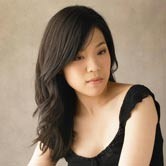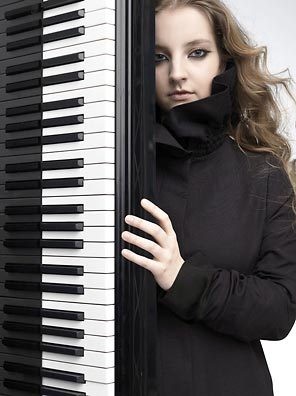Rapturous Russia, Piano Concertos at Chicago's Ravinia Festival
Three Brilliant Young Pianists Perform
By: Susan Hall - Aug 07, 2009
First Concertos of Russian Masters
Chicago Symphony Orchestra
James Conlon, Conductor; Lise de la Salle, Piano; Olga Kern, Piano; Joyce Yang, Piano;Chris Martin, Trumpet.Shostakovich: Piano Concerto No. 1, Op. 35 Prokofiev: Piano Concerto No. 1 in D-flat Major, Op. 10 Rachmaninoff: Piano Concerto No. 1 in F-sharp Minor, Op. 1
Pavilion Ravinia, Illiinois, August 5, 2009
Billed as Rapturous Russia, the stage at Ravinia, summer home of the Chicago Symphony, was filled with glamorous ladies at the top of their game performing the first concertos of Shostakovich, Prokovief and Rachmaninoff.
There is always a first, even though sometimes we'd like to forget it. Not so on Wednesday evening August 5th at the Ravinia Festival, summer home of the Chicago Symphony, where the first piano concertos by Russian composers Shostakovich, Prokovief and Rachmaninoff were vividly recalled. Of course these composers were also famous pianists.
First up was Joyce Yang, a silver medalist at the Van Cliburn competition among her many awards A charming performer she is. Swathed in a shimmering blue sheath, her assignment, the Shostakovich, which is often called a piece of "circus music." Into the musical ring were also pitched phrases from Beethoven, Haydn and Mozart.
Shostakovich regarded the piece as heroic and Ms. Yang brought not only heroism but also magnificent bursts and flurries to the keyboard, often engaging in a musical dialogue with Chicago's principal trumpet, Chris Martin. Shostakovich employed musical collage and techniques forbidden by composers teaching in his day. However, the lavish style exhibited in his first concerto would be abandoned in favor of simplicity and transparency in the future.
Ms. Yang -- like Shostakovich himself -- was the life of the party when she sat down to play. The Russian artist Kustodiyev for whom Shostakovich performed early on, said that he was a man of "peculiar spiritual and emotional sensitivity and wealth of an inner worldÂ…." which "displayed the promising shoots of future blossoms." So too Ms. Yang. She was able to bring 'wholeness' to the seemingly disparate themes and references.
On February 3, 1929 Shostakovich performed the Prokovief first piano concerto, which drew an audience of professional musicians. Shostakovich's take on the concerto was apparently less joyful than sarcastic. He played the fast sections abrasively and the slow sections "reflecting a lyrical tone, not conveying it."
Not so Lise de la Salle, just 21 years old, who swept in to perform Prokovief. Interestingly, Prokovief always 'stepped on the stage in formal dress,' (this referred to his emotionally withheld performance). Ms. De la Salle's formal presentation was a black velvet gown of deep décolletage, clinging from shoulders to ankles, perhaps protecting her emotional display – but her passion was palpable.
A famous piano pedagogue who heard Prokovief perform before he left Russia wrote: "Energy, confidence, indomitable will, steel rhythm..a peculiar epic quality that scrupulously avoided a sense of intimacyÂ….yet with a remarkable ability to convey true lyricism, poetry and sadness...impeccable." This too could be said of Ms. De la Salle.
After an intermission and a change of pianos from Steinway to Yamaha, a more brilliant instrument capable of suggesting a brittle brightness, Olga Kern dramatically entered. She earned couture honors for the evening in a tiered red strapless dress whose construction almost collapsed during the performance – the baring of body parts threatening in a way that would have made the General Manager of the Metropolitan Opera in New York salivate. (His idea of great performance is just such risks. Gets the young guys into the house to see everything and then hopefully be won over to the music. Ravinia was not beyond the ploy).
Ms. Kern had the most challenging music of the evening, the Rachmaninoff Opus 1, composed at 17 and then revised during the 1917 Revolution. She performed with aplomb.
Rachmaninoff was often told that great pianistic talent should not waste its time composing. He continued compose until he emigrated from Russia by sled. Cut off from his homeland, he composed only six more pieces, some of them magnificent.
Rachmaninoff opens the first movement of this piano concerto with flourishes similar to the Grieg Piano Concerto in A Minor, and Ms. Kern executed the expansive solo cadenza and powerful chords masterfully. Her blistering chord passages and daring double octaves show only a few of the reasons she's been recently designated an "Amazing Woman."
What would the pianist/composers have made of their 21st century interpreters? The Ravinia audience went wild for all three of them. Not hard to talk about their talent. But there's an odd issue that has come to the fore in our time and has to do with a composer's politics and its impact on our appreciation. Simply put: we don't perform music composed for Hitler. Should we perform music composed for Stalin?
Rachmaninoff left the Soviet Union after the Revolution and never returned. The commitment of Prokovief and Shostakovich to the Soviet state under Stalin tantalizes today – do we hear dissidence in their music? Probably not, it's thought. Is this a subject for debate? Controversial critic Richard Taruskin says we should not shield culture from real life because art suffocates in thin air. It needs to be wrestled back to earth.
Critic Michael Kimmelman writes: "Pleasure and self-fulfillment [not to please tyrants] are the best reasons to make music or paint pictures, and they're the only reliable defense for promoting classical music now, which is not dyingÂ…but changing." Surely Ravinia gives such pleasure in this modern moment.




